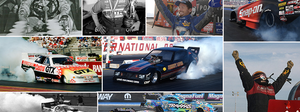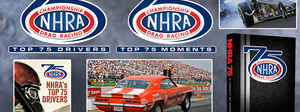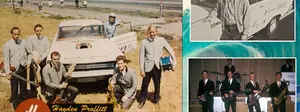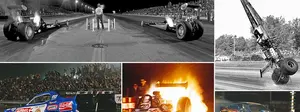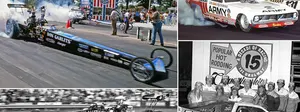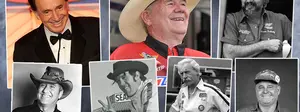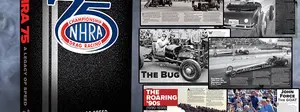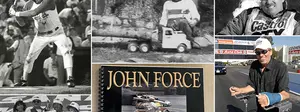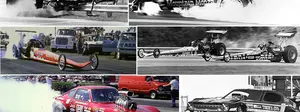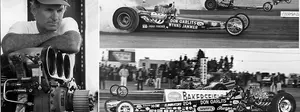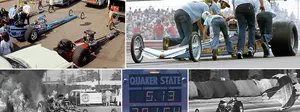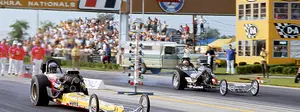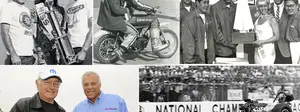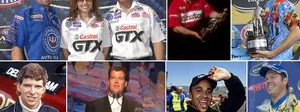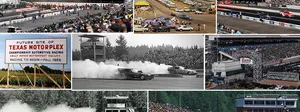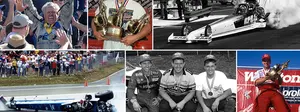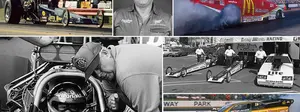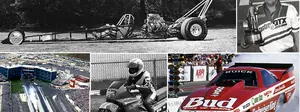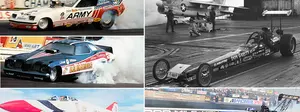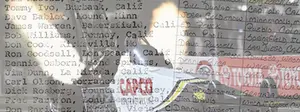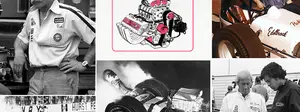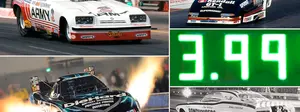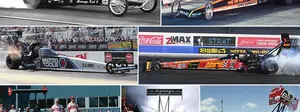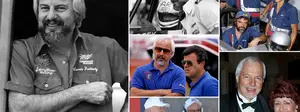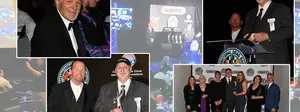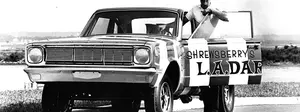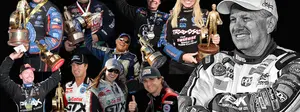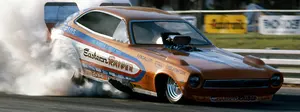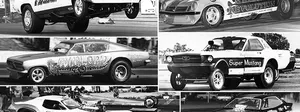Great rivalries over the years
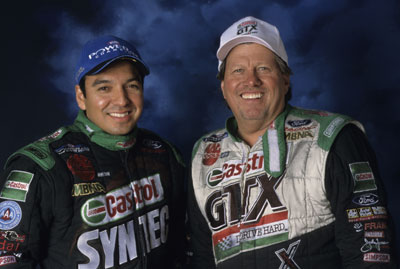
Tony Pedregon and John Force, 2003 .. happier times.
|
The John Force-Tony Pedregon top-end tempest at Indy got me to thinking about great rivalries in our sport.
Rivalries can be created and stoked by any manner of real or artificial devices, but the most prevalent seem to be created by either close competition or verbal jousting. We've seen all kinds of rivalries, from the respectful and good-natured to the bitter and hateful, and even some that have been manufactured, by one or both parties. Sometimes they're just good ol' clean fun, with the fans enjoying two champions trading wins back and forth, and sometimes they're mean and nasty, which keeps the fans on the edge of their seats, hackles up, and defending their driver to the end. A good rivalry sells tickets and T-shirts and generates reams of ink for both drivers.
Although the Force-Pedregon brouhaha may end up as just a minor dustup (though it surely won’t be forgotten), only time will tell if it stands the test of history as a legendary rivalry like some of those mentioned below. This column is not intended as a comprehensive guide to all rivalries over all time but rather a fun look back at a select few that strike my fancy for various reasons.
Stone-Woods-Cook versus "Big John" Mazmanian
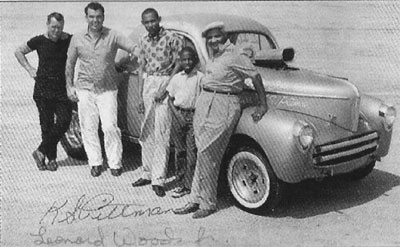 |
The players: Fred Stone and Leonard Woods had been fielding supercharged gas Willys machines since 1960, first with K.S. Pittman at the wheel, then, beginning at the 1961 Nationals, with Doug "Cookie" Cook in the cockpit, leading to the formation of one of the most famous teams in drag racing: Stone, Woods & Cook. When fellow SoCal gasser owner "Big John" Mazmanian traded in his Corvette for a Willys, the die was cast for one of the great all-time rivalries of the 1960s. Fueled as much by hype and rhetoric in a series of ads in the trade papers as by supercharged gas, the two teams battled relentlessly, S-W-C with Olds power and "Big John" and driver "Bones" Balough with Chevy motivation.
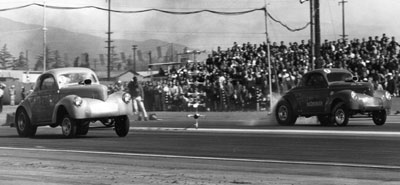 |
The magic moment: Although the two teams raced innumerable times in class and match race competition, one race really sticks out, but it needs to be heavily prefaced. Two weeks prior to the 1964 Winternationals, the two teams met in a hotly debated impromptu pairing at Lions DragStrip; Mazmanian earned bragging temporary rights when Balough beat Cook on a holeshot, 10.23 to 10.15; the back story, however, was that Balough's win came on a rerun after Cook had reached the finish line in front the first time around but had put a wheel off the track in the process. S-W-C got revenge at Pomona, where Cook's holeshot and 10.03 elapsed time gave the prestigious A/GS class win to Stone, Woods & Cook against Balough/Mazmanian's better-but-later 10.02, giving both teams a chance to scream to the papers about supremacy.
After their Pomona win, Stone, ever the pot-stirrer, insisted that if "Big June" (as he mockingly called him) wanted another shot at S-W-C, he would have to put up $3,000 "for the honor and privilege of racing them." That winter, Mazmanian had replaced his Chevy powerplant with a 467-cid Chrysler, and after Balough uncorked an unearthly 9.77 in winning the Bakersfield March Meet, S-W-C quickly followed suit, abandoning their Oldsmobile for a 440 Chrysler.
Lions manager C.J. "Pappy" Hart finally got them both to the bargaining table and offered a $1,000 winner/$600 runner-up two-of-three proposal for the two giants to duke it out at Lions May 2. An overflow crowd packed Lions that night to witness the shootout. Balough won the first go-round, again on a holeshot, 9.96 to 9.91. Ninety minutes later, they returned to the line, but this time, Balough was too quick for his own good, red-lighting to tie the score as both drivers shut off early. Drag News' Ralph Gudahl wrote of the pre-final scene, "It looked like a sale at Macy's as everyone pushed to the fences, hung from poles, anything to gain a full sight of the course." The rubber match went to Cook and the blue Willys, 9.93, 141.06 to 9.99, 141.06. Despite their sharply traded pre-race barbs, members of both teams shook hands and congratulated one another, but the fans were the real winners.
Don "the Snake" Prudhomme versus Tom "the Mongoose" McEwen
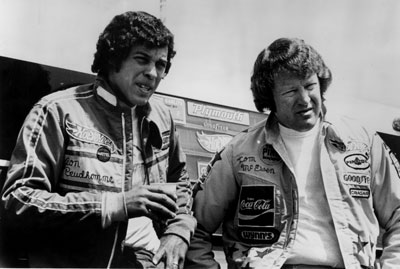 |
The players: Mother Nature's battle became drag racing's when Tom McEwen, the promoter, and Don Prudhomme, the die-hard racer, created Wildlife Racing to bring The Jungle Book to life, thanks to sponsorship from Mattel toys that made them household names in the grubby paws of every little kid who could stick together two pieces of plastic orange track and let gravity do the rest. Prudhomme had long been "the Snake," and the wily McEwen, knowing that a mongoose was one of the few animals that could beat a snake, chose his nickname accordingly. McEwen, who already had made a name for himself hustling sponsorships for his race team, had an in at Mattel, where his mother worked as a secretary and his stepfather as a lawyer. That earned him entrée to company VP Art Spears in 1970, and before you could say "Jackrabbit Special," the two each had a Funny car and a Top Fueler, decked out not only with Hot Wheels colors but accompanying deals from Coca-Cola, Plymouth, and Goodyear, who were all eager to hop on to the fast-moving express. The two match raced exhaustively against one another, with Prudhomme generally getting the upper hand. Although the team only lasted three years, their battles, real and imagined, raged on, and fans never got tired of seeing them race one another.
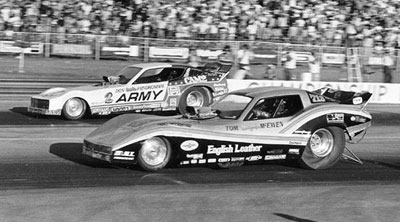 |
The magic moment: Prudhomme won it all. Four championships and 49 national event wins; McEwen accrued just four NHRA Wallys. McEwen had never beaten Prudhomme in an NHRA final, and "the Snake" personally stopped McEwen from winning four times -- in the Funny Car finals at the 1975 Fallnationals, the 1976 Springnationals and Summernationals, and the 1978 Springnationals — but McEwen got the one that mattered most, the 1978 U.S. Nationals. In a storybook ending, McEwen, still grieving the loss of his son, Jamie, to leukemia just weeks earlier, upset Prudhomme in the final round at Indy. McEwen, overcome with emotion, sat in the car at the top end, and Prudhomme slithered his way beneath the body to join his old pal, rival, and occasional thorn in the side in a truly emotional and unforgettable moment that a few years ago was voted the Most Memorable Moment in U.S. Nationals history.
Shirley Muldowney versus "Big Daddy" Don Garlits
 |
The players: You could probably define the history of Top Fuel from its start to its present day with just their names. Don Garlits, the grizzled and experimental hot rodder from Florida who set the bar for fuel racers everywhere, and Muldowney, who went from Schenectady, N.Y., street racing waitress to champion driver without the benefit of a deep background in automotive technology yet broke ground just as important as Garlits. While "Big Daddy" was down in the dirt checking the bearings, Muldowney, though not adverse to getting dirty, was tending to her growing legions of fans in the Women's Lib era of the early 1970s.
In the 1960s and '70s, Garlits was old-school popular; he built, tuned, and drove the cars, and to him, utilitarian mattered most of all. He was a drag racer's drag racer, yet part of a dying breed as the 1980s and '90s roared into view. Muldowney represented the newer breed. Sure, she had earned her driving stripes in gas dragsters, but she represented a new school: the driver. Her job was to drive and to attract fans and sponsors, whose addition to the team were becoming almost as important as horsepower. She paved the way for and inspired not only other women but men as well. How many of today's top nitro jockeys are not required to work on the cars? Yeah … 99 percent of them. Muldowney's immaculate driving skills were worth more than their weight in nitro, and, like Tony Schumacher and Larry Dixon today and Joe Amato and Gary Ormsby before them, she took care of business in the cockpit and at the ropes.
For Garlits and Muldowney, their different styles both separated and congealed them, giving one another ammunition in their well-publicized verbal jousts, but behind it all, you were always left wondering where the jabs ended and where the respect began.
Muldowney told Hot Rod Magazine, "Don't think Garlits and I didn't hate each other. I hated him and he hated me. But I still respected him. I have always respected him. What, are you kidding me? He's Don Garlits, 'Big Daddy.' We're very good friends now, but back then he just hated a woman kicking his ass. He hated my guts. He was awful. They rode him terribly if he lost. It was horrible."
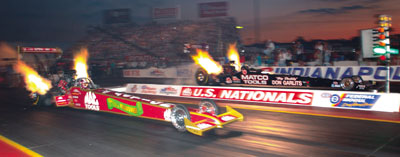 |
The magic moment: Wow, where to start? Their track time might well be bookmarked by U.S. Nationals appearances decades apart: Muldowney's first Top Fuel final, against Garlits, at the 1975 U.S. Nationals (where, after winning his semifinal race, he's famously caught on camera at the top end, clucking in shock, "The lady dragster driver is in the final …") and, for us bleeding-heart fans, their side-by-side qualifying pairing at the 2001 U.S. Nationals. Between, they matched raced scores of times before delighted crowds, often as the night's highlight, their fevered efforts to one up the other softened by moments such as when Muldowney, from her hospital bed after a near-career-ending wreck in Montreal in 1984, exhorted Garlits to "go kick their butts" at Indy that year, which he did, and he even briefly served as a consultant for her after her comeback. But for me, one of the all-time-great Garlits-Muldowney moments was the final round at the 1982 Gatornationals (oddly enough, that final and the 1975 Indy final were the only two NHRA national event finals in which they battled).
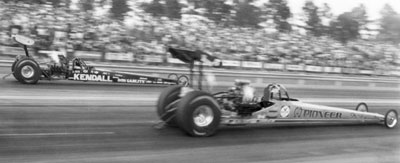 |
There they were, in Gainesville, on Garlits' home turf; they qualified fifth and sixth, favoring Garlits by only a few thousandths of a second, 5.783 to 5.788. Garlits had knocked off the newest female contender, recent March Meet winner Lucille Lee (who also would win in Atlanta six weeks later), Johnny Abbott, and Jim Barnard with a best of 5.72, and Muldowney's pink Pioneer Special entry had recorded blasts of 5.80, 5,82, and 5.90 in trailering Mark Niver, Jody Smart, and Connie Kalitta. Muldowney's 5.90 defeat of Kalitta earned her lane choice against Garlits, who had run just an engine-wounding 5.94 against Barnard, setting the stage for a whopper of a final. Diamond P's Steve Evans interviewed her before the final, and although my memory of the entire interview is a little fragile, I do remember her being asked to rate Garlits as a starting-line driver, and her response about "Donald" was classic: "Marginal," she replied. Garlits, who had to change engines before the final, did get the drop on her at the green, .469 to .484, but that was the only time he led as she wheeled her way to her 12th win on a 5.86 to 6.28 decision.
Shirley Muldowney versus Connie Kalitta
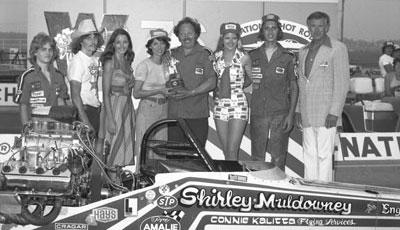 |
The players: Connie Kalitta mentored Shirley Muldowney and her husband, Jack, in their fledging fuel days and ultimately ended up as much more to Muldowney after her divorce from Jack. She became "the Bounty Huntress" to his "Bounty Hunter," but the relationship was short-lived. Together they won the 1977 NHRA Top Fuel championship but split up soon after, and, after two rebuilding years, she won the 1980 crown without him -- even kicking off that season by besting Kalitta in the Winternationals final – and again was the champ in 1982. He was there for her in 1984, after her grievous accident in Montreal, to offer her a flight home on his chartered jet, but since then, it's been an on-again, off-again relationship (currently and most likely permanently off).
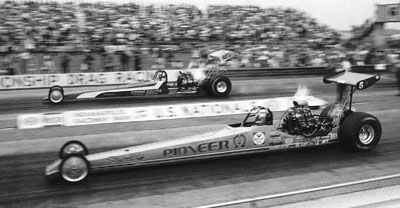 |
The magic moment: The two raced dozens of times in national event competition, but the most remembered is the final round of the 1982 U.S. Nationals. It would be their last final-round joust, and it was a great one: Kalitta was in the midst of a great season and had already defeated her in the final in Montreal, and neither had won the U.S. Nationals yet in their great careers. Muldowney qualified No. 2 behind Gary Beck's otherworldly 5.48 with a 5.57 and ran 5.56, 5.62, 5.65, and a final-round 5.57, 251.39 to best Kalitta's 5.66, 241.28 in the then quickest side-by-side pairing in drag racing history.
Warren Johnson versus Scott Geoffrion
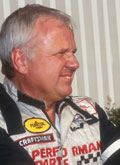 |
 |
The players: Sure, this could have been Warren Johnson versus Greg Anderson or W.J. versus Bob Glidden, but those might be less interesting. There's no doubt that W.J., Glidden, and Anderson are the kings of Pro Stock in the last three decades, and, despite their on-track ferocity, it's a good bet that there's now more than a bit of mutual (albeit unspoken and certainly delayed) respect for all that each has accomplished. W.J. even famously once said about losing to Glidden, "I never take losing to an individual personally," to which Glidden countered, "Johnson could lose to anyone and not care unless it was me. He couldn’t stand losing to me … I suppose that if a rivalry existed between Warren and me, it was because he couldn’t stand it when I was beating him."
Regardless, the Pro Stock rivalry that always intrigued me was "the Professor" against his student, the late Scott Geoffrion. W.J. gave the young New Jersey kid his first ride in 1991, but Geoffrion forsook his mentor and in 1992 joined the Wayne County Dodge team, where he experienced the bulk of his career successes, some against his teacher. W.J. whipped Geoffrion like the proverbial red-headed stepchild in final rounds from 1992 to early 1994, beating him five straight times before Geoffrion finally flunked "the Professor" in the 1994 Atlanta final and again that year in Dallas. Geoffrion's teammate, Darrell Alderman, had won the championship in 1990, '91, and '94, with W.J. winning the two between, and the skepticism about the source of the Dodge Boys' power no doubt fueled the ornery feelings.
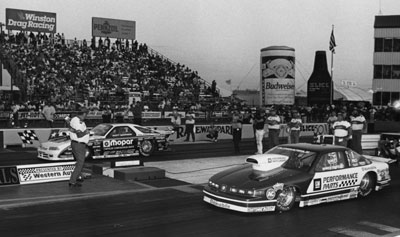 |
The magic moment: It's Houston, March 1994, and the Dodge Boys were hot off a 1-2 finish in Phoenix, where Geoffrion beat W.J. in the semifinals and teammate Alderman in the final, and they qualified 1-2 in Houston, with Geoffrion atop the pack with a 7.03 and Alderman second at 7.061; W.J. sat third with a 7.065. Geoffrion handily beat Jerry Eckman, Mark Pawuk, and Kurt Johnson with his best run of eliminations, a 7.07. W.J. had mowed down Steve Schmidt, Jim Yates, and, in a huge semifinal clash, Alderman, with a 7.07 that earned him lane choice against Geoffrion.
Both drivers lit their pre-stage bulbs and then sat without moving for nearly a minute as the crowd – which favored Geoffrion based on announcer Dave McClelland's pre-burnout poll – buzzed above the idle of their engines and Geoffrion's occasional rap on the throttle. W.J. later said that he knew that Geoffrion had been instructed by team boss Dave Hutchens not to stage first and had not even bothered to warm his engine before the run.
After 30 seconds, Chief Starter Buster Couch ordered both to stage. Neither would comply, so Couch ordered them to back out of the beams and shut off their engines. After a few minutes to cool down, Couch ordered them to restart and told them to stage within 10 seconds, which both did, barely under the wire. Geoffrion got the slight jump, .460 to .477, but W.J.'s cooler engine pulled him through to a 7.07 to 7.10 victory. Words – and invitations to swap punches — were offered by both at the top end.
Johnson later explained, "I'm no virgin at this. Everybody knows that Scott was instructed to stage last, so I was going to sit there and wait for my Social Security check if that's what was necessary. It was a game to teach the kid a lesson."
Geoffrion retorted, "I don’t know what all this lesson stuff is about since I cut the better light. He's just a whiner."
The Dodge Boys had the last laugh – finishing the season 1-2 ahead of Johnson, though W.J. surely drew belly laughs the next year in Houston when he and Geoffrion were paired in qualifying. As they prepared to stage, a trio of dogs jumped the guardwall on the top end, and W.J. and Geoffrion were shut off on the starting line. Never one to miss an opportunity to needle, W.J. later quipped, "I didn't know what was going on until someone on the starting-line crew told me there were dogs on the track. My response was, 'I know, he 's in the other lane.' " Ouch.
Joe Amato versus Gary Ormsby
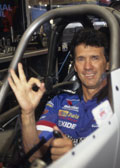 |
 |
The players: Almost since his debut in Top Fuel, Joe Amato, with crew chief Tim Richards, was a serious player. In 1983, just their second full season, they won three times and finished second behind Gary Beck and scored four times the following year to win their first of five titles in the next two decades. Ormsby had returned to Top Fuel in mid-1983 after a long absence and won his first title at the 1984 Winternationals, at Amato's expense. That didn’t really strike the match to light the rivalry because for his first several years, Ormsby's Lee Beard-tuned entry was a fifth-place-type car while Amato was always among the top three. Ormsby's Castrol GTX mount really came to life in 1989, when he won six times en route to nosing out Amato for the title. They raced three times in the final that year, and Ormsby won two – they were an even 5-5 in final rounds against one another in their rivalry, and only once did each win more than one time in succession – and Amato struck back the following year to regain the championship. Amato and Ormsby dominated 1990, with each winning six times (on a 19-race schedule), and the championship came down to the final round in Pomona. Ormsby died of cancer in the summer of 1991 or there's no telling how great this gentleman's rivalry could have become.
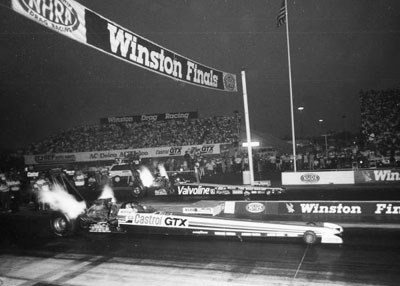 |
The magic moment: Ormsby entered the 1990 season finale trailing Amato by 254 points, but by setting low e.t. (with a 5.01, then worth 50 points) and qualifying ahead of him by two positions (No. 1 to No. 3, for four more points), he was exactly 200 points (or one round-win) behind Amato going into eliminations.
Amato, who had defeated Ormsby, 4.96 to 5.09, in Saturday's $50,000-to-win Top Fuel Classic final, was steadily consistent Sunday with runs of 5.02, 5.02, and 5.03 for wins over Wayne Bailey, Eddie Hill, and Gene Snow. Ormsby was in the five-teens in trailering Jim Head and Don Prudhomme but earned lane choice for the race of his life with a 5.02 to 5.09 semifinal win against Kenny Bernstein. With a final-round win over Amato, he could tie him to the point. It was the perfect storm.
Ormsby staged last and left first … but too soon. G.O. red-lighted, but it probably didn't matter as his green and white machine quickly went up in smoke. Amato went right down the track and, to add insult to injury, bettered Ormsby's low e.t with a track record 4.93. The final points tally, 16,058 to 15,558, didn’t reflect the closeness of the battle, but Amato still left Pomona with his third championship, tying him with Don Garlits and Shirley Muldowney.
John Force versus Whit Bazemore, Al Hofman, Cruz Pedregon
 |
The players: When you're at the top as long as John Force has been, there are a lot of people gunning for your head, and when you have a near-monopoly like Force did – plus the biggest and highest-paid team – it's not hard for people to get their noses out of joint and eagerly take shots at you, verbally and physically.
Certainly Whit Bazemore, Al Hofmann, and Cruz Pedregon (and probably a few others) could be counted as having legitimate rivalries with Force, ones that went to varying degrees of hostility, outspokenness, and determination. Hofmann probably was the driver most like Force, a from-the-ground-up junkyard dog who asked and gave no quarter. Hofmann never won a world championship, never finished ahead of Force in the standings, and had a dismal 13-43 record against Force (4-9 in final rounds), yet he still may have been the opponent whom Force feared most because, like him, he was hungry.
Pedregon was a winner in the alcohol ranks before he turned Pro, and being in the saddle of the well-funded McDonald's entry certainly didn’t hurt his successful bid to end Force's two-year championship run in 1992. Of the three, Pedregon fared the best against Force, winning about a third of the time (hey, you take your successes where you can) but holding a losing record of 53-25.
I asked longtime Force publicist Dave Densmore which of the three he thought Force might consider his top rival, and Dens picked Bazemore, which surprised me. Bazemore certainly had the worst record of the three against Force (46-10), but "ol' Baze" had a way of getting Force's goat every time. Never afraid to speak his mind no matter the topic or the political correctness, Bazemore, who at various times reportedly was considered a potential Force hire, surely knew how to get Force riled up, making him dangerous on another front.
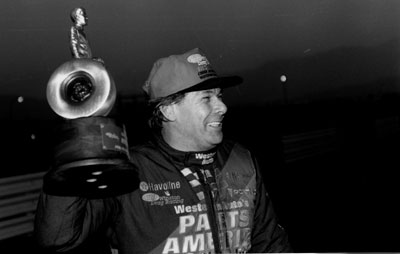 |
The magic moments: For Force and Hofmann, I'd have to say it was the 1996 Winternationals, where Hofmann, who had beaten Force seven times in 12 meetings the previous two years, overcame Force's psychic .401 light to win, then added fuel to the fire in the pressroom by jabbing at Force, who was standing nearby. "Some guys come to the races with two or three cars, three crew chiefs, and a bus. I've got one car and one crew chief, so obviously he's a lot more worried about me than I am about him," he said, a smirk playing across his face. Force fired back, "Where do you get this stuff, Al?" then muttered to those standing by, "Al has a lot more winning to do before he catches up with me." Hofmann took his turn, telling the media, "John must have been brain-dead to have a reaction time like that. Obviously he was worried." Yeah, these two guys loved each other.
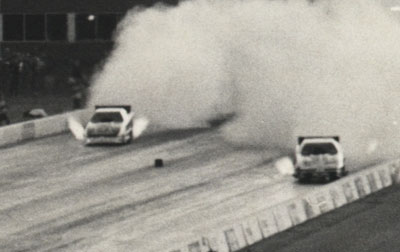 |
For Pedregon and Force, it was, of course, the final round of the Dallas event, with Pedregon on the verge of taking Force's hard-won championship crown. Force smoked the tires but refused to give up and finally smacked the guardwall, disqualifying himself, but kept after the throttle, whipping the car relentlessly and bouncing off the wall a few more tires like a crazed bull trying to chase down Pedregon in the lights if for nothing more than a moral victory. Force actually flipped the car at the next race, in Pomona, overdriving a tire-smoking qualifying run and turning his car turtle. Pedregon clearly had gotten into his head, and the proud and usually unflappable champ certainly was flappable (and flippable).
For Force and Bazemore, Densmore pointed to their 1999 final-round battle in Atlanta as a key moment for Force. Bazemore left on Force, .492 to .527, but Force chased him down to win by just .001-second, 5.147 to 5.182 .
Tony Schumacher versus Larry Dixon, Doug Kalitta, J.R. Todd, and "Hot Rod" Fuller
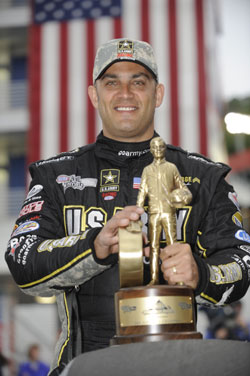 |
The players: Because he's sponsored by the U.S. Army and for the last five years has run over everything in sight, let's compare Tony Schumacher to an Abrams M1A1 tank and his rivals to the munitions used against him. Larry Dixon is the only guy other than Schumacher to have won the championship since 2002 and the only other guy to win Indy this decade. He'd have to be like a TOW missile, about the only thing that I can think of that can take out the Abrams. They've traded wins, and although Schumacher's 2008 dominance blew out the candles a bit on their rivalry, Dixon driving for ex-Schumacher tuner Alan Johnson certainly has rekindled it. Doug Kalitta is probably more like a Sherman tank -- capable of inflicting damage to Schumacher in his day, but his best days in this rivalry are temporarily behind him. I’d equate J.R. Todd with a land mine. He certainly couldn’t go head to head with Schumacher every run but was fully capable of ambushing him and taking him out. Rod Fuller largely created the rivalry against Schumacher himself, and because "the Sarge" gave it little regard, Fuller is almost like machine-gun bullets bouncing off of Schumacher's shell yet still plenty noisy and occasionally capable of causing wounds.
The magic moments: Pick any one of the four Indy finals where Schumacher and Dixon raced, and you have an instant classic. After trading wins in 2002 (Schumacher) and 2005 (Dixon), Schumacher won again last year, so you can bet Dixon was looking to even the tally this year and perhaps also a little eager to stop Schumacher from tying Dixon's hero, Don Garlits, with eight Indy wins. Plus there's that whole Alan Johnson thing. Schumacher won again and holds a staggering 11-4 final-round edge on Dixon, but I'm not sure I've ever heard a cross word from either of them about the other. They may have thought it, but they never said it.
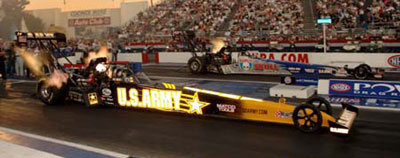 |
You can't think about Schumacher and Kalitta without thinking of "The Run" at the 2006 Auto Club NHRA Finals, and it wasn't even a race betweeen the two. Kalitta entered the season finale with an almost insurmountable lead, and the only way Schumacher could pass him was to go three rounds further in Pomona. When Kalitta reached the semifinals, Schumacher's options narrowed. Although Kalitta lost in the semi's, on a painful holeshot to Melanie Troxel, and Schumacher won his side, "the Sarge" entered the final not only needing to win but also to run at least 4.437 to reset the national record for the 20 bonus points; a win alone would leave him six points shy of Kalitta. With Kalitta watching from the top end, Schumacher lit the win lamp and the scoreboard with an improbable 4.428 to earn the championship by 14 points.
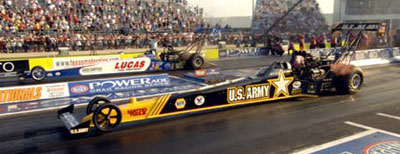 |
Todd has been an occasional thorn in Schumacher's side since he upset him in the final of the 2006 Denver race – followed by a mocking salute as he stood up in the cockpit – and, with a 3-1 mark, he's one of the few with a winning final-round record against Schumacher. The race we'll always remember, though, took place last year in Dallas, with Schumacher on a record-breaking tear. Schumacher had not lost a single round from early July through that late September day, racking up seven straight event wins and winning 31 straight rounds – both records – before facing Todd in the Dallas final (pictured). With the smart money favoring yet another win by the Army juggernaut, Todd whipped a holeshot on Schumacher and emerged with a stunning 3.912 to 3.910 victory.
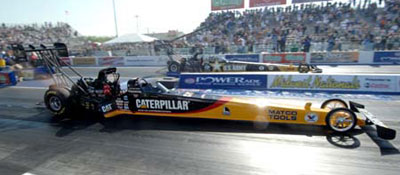 |
Fuller beat Schumacher in the final to win his first Top Fuel title – in Memphis in 2005 – and quickly proclaimed, "To be the man, you have to beat the man, and today we were able to do that." The two dueled for the championship in 2007, with Schumacher winning again, but surprisingly, Fuller owns a 2-1 final-round advantage over Schumacher, yet it seems that it was a few choice words that stung Schumacher most. After Fuller beat him in the 2008 Madison final (pictured), Fuller said that the Don Schumacher Racing DSR initials really stood for "Dark Side Racing" (à la Star Wars), to which "the Sarge" bristled, "You can throw names out, but the right word to say is 'champion.' We earned that name. The rivalries will come later in the season. If you are going to make a rivalry, step up. Me and Doug Kalitta had a great rivalry and never had to say anything."
OK, race fans, that's it for today. It's time to check out this year's real rivalry: NHRA versus the rain. The wet stuff is coming down in Charlotte, and there's an iffy forecast for the weekend, so we'll keep our fingers and toes crossed. See ya next week.



